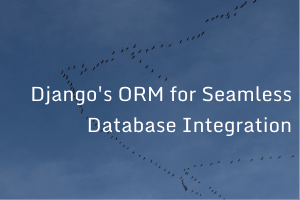Introduction
Django, a widely used Python web framework, offers developers a convenient and high-level approach to interacting with databases through its Object-Relational Mapping (ORM) system. This article delves into the core concepts of Django ORM, highlights its advantages, and provides insights into effectively leveraging it to develop robust and performant web applications.
Understanding Django ORM
Django ORM functions as an intermediary between relational databases and Python code. It enables developers to define database models as Python classes, each representing a table’s structure. Attributes within the model class correspond to table columns, while relationships between models are established using fields such as ForeignKey, OneToOneField, and ManyToManyField.
Benefits of Django ORM
- Abstracted SQL: A major advantage of Django ORM is its abstraction of SQL queries. Developers can manipulate databases using Python syntax, simplifying the creation, retrieval, update, and deletion of records without the need to craft intricate SQL queries.
- Database Independence: Django ORM maintains a consistent interface across various database backends, including PostgreSQL, MySQL, SQLite, and Oracle. This allows developers to switch databases seamlessly without necessitating extensive code modifications.
- Automated Query Generation: The ORM generates SQL queries based on model definitions and operations performed. This automation relieves developers from crafting low-level queries, while the ORM optimizes these queries for enhanced efficiency.
- Enhanced Security: Django ORM contributes to security by mitigating common vulnerabilities such as SQL injection. It automatically escapes and sanitizes input data to prevent malicious attacks.
- Streamlined Model Relationships: Defining relationships between models is straightforward. ForeignKey establishes a one-to-many relationship, OneToOneField signifies a one-to-one relationship, and ManyToManyField represents a many-to-many relationship.
Working with Django ORM
- Model Definition: Models are articulated as Python classes that inherit from django.db.models.Model. Each attribute within the model class corresponds to a database field. Fields possess attributes such as data type, default values, and constraints.
- Record Creation and Retrieval: Creating new records involves instantiating the model class and invoking .save(). Retrieving records utilizes the objects attribute of the model, which offers methods like .filter(), .get(), and .all().
- Filtering and Ordering: Django ORM provides an extensive query API for filtering and ordering records. For example, .filter(name__icontains=’John’) retrieves records with names containing “John”.
- Aggregation and Annotation: Aggregations like counting, summing, and averaging are achievable via the .aggregate() method. Annotation allows for the addition of calculated fields to query results.
- Updating and Deletion: Record updates are facilitated by modifying attributes and invoking .save(). Deleting records is executed using .delete().
- Model Inheritance: Django ORM supports model inheritance, empowering developers to construct new models by inheriting attributes and methods from existing ones.
Performance Considerations
While Django ORM simplifies database interactions, optimizing performance requires consideration:
- Select Related: Employ .select_related() to optimize queries involving foreign key relationships, curtailing the number of database queries.
- Prefetch Related: For many-to-many and reverse foreign key relationships, .prefetch_related() significantly enhances performance by fetching related records in a single query.
- Indexing: Establish relevant indexes on fields employed for filtering and sorting to expedite query execution.
Conclusion
Django’s Object-Relational Mapping (ORM) serves as a potent tool for streamlining database interactions in web applications. By abstracting SQL queries and offering a Pythonic interface, Django ORM boosts developer productivity and simplifies application maintenance. Proficiency in comprehending the core concepts and harnessing the advantages of Django ORM empowers developers to construct efficient and resilient web applications without immersing themselves in the complexities of raw database interactions.
jQuery allows the user to create powerful and dynamic webpages that run without any hiccup. With StudySection, you have the liberty to choose among beginner or expert level jQuery Certification Exams to help you excel in this career field.




